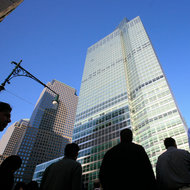 Mark Lennihan/Associated PressGoldman Sachs’s headquarters in Manhattan.
Mark Lennihan/Associated PressGoldman Sachs’s headquarters in Manhattan.
Goldman Sachs has agreed to pay $1.5 million to settle federal accusations that it failed to supervise a trader who fabricated “huge” positions at the bank, a modest deal that divided the government regulators who brought the case.
The Commodity Futures Trading Commission, which voted 3 to 1 in favor of the fine, took action against Goldman over trades stemming from late 2007.
At the time, Matthew Marshall Taylor, then a trader at the Wall Street firm, was accused of entering fabricated trades that concealed a $8.3 billion position. The trading resulted in nearly $119 million in losses for Goldman.
The Wall Street firm, the commission said on Friday, “failed to have policies or procedures reasonably designed to detect and prevent” improper trades.
The agency further claimed that Goldman did not keep a close enough eye on Mr. Taylor.
The bank, in striking the settlement deal, agreed to improve its compliance systems.
But the fine, a token sum for a firm the size of Goldman, caused a stir among the agency’s commissioners.
Bart Chilton, a Democratic commissioner at the agency, supported the regulatory sanctions but declined to endorse a fine that he cast as too low.
“Given the egregious nature of the failure to supervise adequately, combined with the high number of violative transactions, I believe that the monetary penalty should be significantly higher in order to represent a sufficient punishment, as well as to denote a meaningful deterrent to future illegal activity,” Mr. Chilton said in a dissenting opinion.
“I do not believe” that the $1.5 million penalty “is anywhere close to an amount representing a sufficient penalty or deterrent.”
The agency’s two Republicans — Jill E. Sommers and Scott D. O’Malia — voted in favor of the fine. So did Mark Wetjen, another Democratic commissioner.
Gary Gensler, the agency’s chairman, was recused from the case because he had spent nearly two decades at Goldman as a banker and later an executive.
In challenging the penalty, Mr. Chilton cited an agency rule that allows it to assess $130,000 in fines for each violation. In the case of Goldman, the agency pinpointed 60 violations, which could have prompted a fine of $7.8 million, a sum that Mr. Chilton called “more appropriate.”
His dissent called to mind broader questions about the government’s use of enforcement muscle on Wall Street. The trading commission this year levied a major $200 million fine against Barclays for manipulating interest rates, the first of several expected sanctions against big banks.
But public frustration has run high with the larger struggle to charge Wall Street executives involved in the financial crisis.
Federal judges also have balked at fines the Securities and Exchange Commission has assessed against big banks like Citigroup, questioning whether the firms received a free pass.
Unlike the crisis, however, the trading commission’s case against Goldman was limited. The agency saved its most significant accusations for Mr. Taylor. “Taylor admitted his conduct following market close and was subsequently terminated,” the bank said in a statement.
“Since these events, we have enhanced our controls,” Goldman said, adding that the trades had no impact on customer money.
In a separate enforcement action last month, the trading commission accused Mr. Taylor of defrauding his employer. Mr. Taylor, the agency said, bypassed Goldman’s internal controls and manually entered his “fabricated” futures trades so they did not register on the radar screen of the CME Group, the giant exchange.
That case is still pending. His lawyer, Ross B. Intelisano of Rich, Intelisano Katz, declined to comment on Friday. Previously, he has said that his client denies all the allegations.
Despite the stain on his record, Mr. Taylor was hired by Morgan Stanley. He has since left the firm.
He is not the only Goldman trader to end up at Morgan Stanley that has recently run into trouble with regulators.
In recent weeks, regulators at the CME, which runs commodity and futures exchanges, said in a regulatory filing that they are investigating Glenn Hadden and his trading activity in Treasury futures in 2008 while he was at Goldman. Mr. Hadden, a former Goldman partner, was hired as the head of global rates at Morgan Stanley in early 2011.
A lawyer for Mr. Hadden declined to comment. In a previous statement, he said his client acted properly and followed established market practice.
A version of this article appeared in print on 12/08/2012, on page B3 of the NewYork edition with the headline: Goldman Fined Over Improper Trading.
Article source: http://dealbook.nytimes.com/2012/12/07/goldman-to-pay-1-5-million-for-failing-to-supervise-trader/?partner=rss&emc=rss